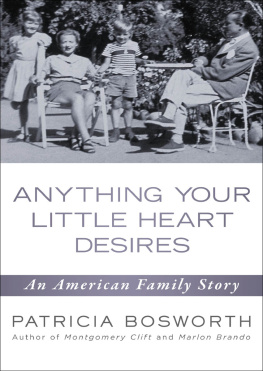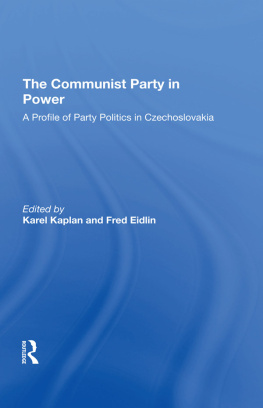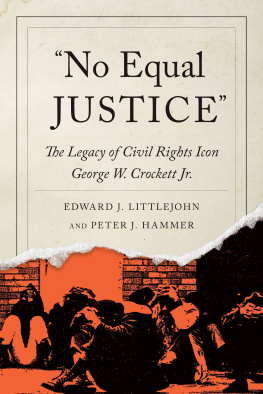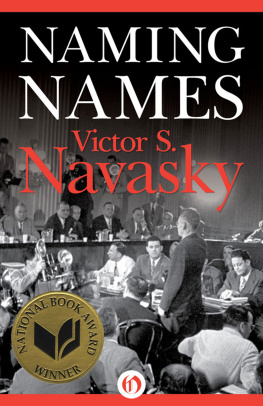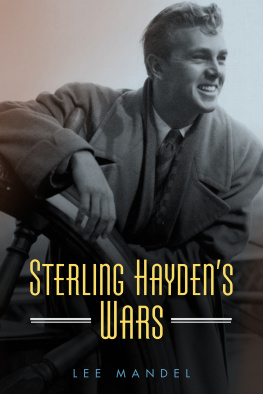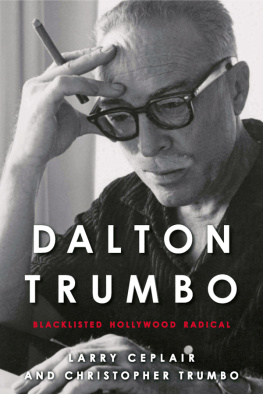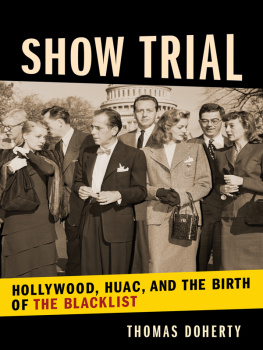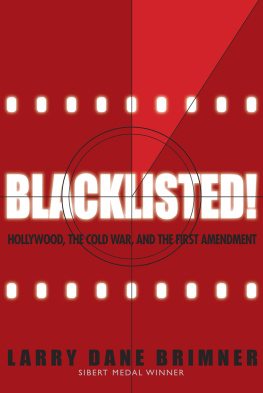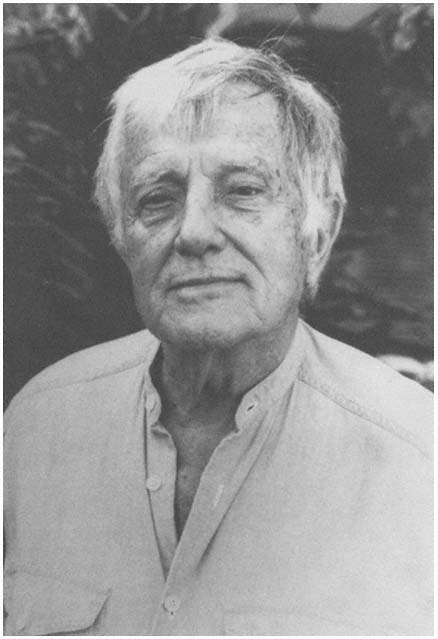
Odd Man Out
A Memoir of the Hollywood Ten
Edward DmytrykSouthern Illinois University Press
Carbondale and EdwardsvilleCopyright 1996 by Edward Dmytryk All rights reserved Printed in the United States of America Designed by Hillside Studio, Inc. Production supervised by Natalia Nadraga 99 98 97 96 4 3 2 1
Library of Congress
Cataloging-in-Publication Data
Dmytryk, Edward.
Odd man out: a memoir of the
Hollywood Ten/Edward Dmytryk.
p. cm.
Includes index.
1. Dmytryk, Edward. 2. Motion picture
producers and directorsUnited States
Biography. 3. Communism and motion
picturesUnited States. I. Title.
PN1998.3.D6A3 1996
809'.916dc20 dc20
[791.43'0233'092]
[B] 94-39958
CIP
ISBN 0-8093-1998-5 (cloth).
ISBN 0-8093-1999-3 (paper)
The paper used in this publication meets the minimum requirements of American National Standard for Information SciencesPermanence of Paper for Printed Library Materials, ANSI Z39.48-1984.
I allowed myself to be forced into a position of feeling guilty... about the very virtues of love and pity and a passion for individual freedom which had brought me close to Communism. The Communists told me those feelings were "bourgeois." The Communist, having joined the Party, has to castrate himself of the reasons which have made him one.
Stephen Spender, The God That Failed
1. Mr. Tavenner. What is your name, please?
Mr. Tavenner. What is your name, please?
Mr. Dmytryk. Edward Dmytryk.
Mr. Tavenner. And the spelling is D-m-y-t-r-y-k?
Mr. Dmytryk. That is right.
Mr. Tavenner. When and where were you born, Mr. Dmytryk?
Mr. Dmytryk. I was born in Canada, Grand Forks, British Columbia, September 4, 1908.
Mr. Tavenner. Are you a naturalized American citizen?
Mr. Dmytryk. I am...
Mr. Tavenner. What is your profession?
Mr. Dmytryk. I am a screen director...
Mr. Tavenner. And you are one of those commonly referred to as the "Hollywood Ten"?
Mr. Dmytryk. I was.
Mr. Tavenner. I notice you say you "was", rather than "are."
Mr. Dmytryk. I don't think I will be considered so much longer.
Mr. Tavenner. Your testimony today will throw considerable light on the subject?
Mr. Dmytryk. I imagine so, yes.
Mr. Tavenner. I believe you are one of the group who were prosecuted for contempt of Congress, and that you received a sentence, and that you have served that sentence?
Mr. Dmytryk. I have, yes.1
1. House Committee on Un-American Activities, April 25, 1951. All of the hearing material in this book is excerpted from the official transcripts of the Hearings before the Committee on Un-American Activities of the House of Representatives.
Saint John quoted Christ as saying, "And the truth shall make you free." Well, I was willing to give it a try. Not that I had lied the first time. I had, in effect, said nothing, and I had been sorry for it ever since. Now I was trying to make amends: to Congress, to my wife and family, and to others who had been hurt in the process. After nearly four years of navigating a storm-driven sea, where each impossibly dark cloud was blacker than its predecessor, and which had included two years in exile and six months in prison, I was steering for a harbor that might furnish some peace and stability. But I had still to negotiate a most-difficult passage I had to exorcise the past, and I knew even then that the rite of purgation heals old wounds only at the cost of new ones that would affect the remaining years of my life. I had to make a second appearance before the House Committee on Un-American Activities (HUAC). And I was sworn to tell the truth, the whole truth, and nothing but the truth, and to tell it in public.
I was going to name names.
But jumping into the middle of this story is no way to relate a tragedy that actually began in California on a fateful day in 1947.
That was a great year for clarets; it was also a great year for me, at least for the first nine months. September in southern California is usually a month of beautiful days, and this particular late September day was perfect. Thirty years later, I wrote in my memoirs: "I was on top of the world and confident of the future. The way things were going I could be rich in a few years. Jean and I were more in love than ever. We had bought a hundred acres near Agoura, were drilling water wells, and planning our house and horse farm. One Sunday afternoon, after a day spent in pruning some of the great oaks trees on our land, Jean and I sat on a hill looking out over a lovely landscape. We could see forever, and there wasn't a cloud in the sky. The next day I was handed a pink subpoena."
For me, and for Jean, that hot pink subpoena marked the beginning of a new and difficult life, though I didn't know it then. Like many dire documents, it had a totally unexpected cause, fathered by misunderstanding and born of fear. Its distressing aftereffects brought outrageous fortune to scores of other lives and still affects, in a number of ways, not the license but the freedom of too many Hollywood filmmakers.
Something as intimidating as a congressional subpoena is, by its very nature, never the beginning of an investigation; it is a culmination of earlier sleuthing of which the recipient of the subpoena is quite ignorant. And sifting through the past years for a clue to the real start of this unwelcome situation led me back to a short time after the Japanese attack on Pearl Harbor, another date that changed millions of lives but affected mine only indirectly.
Despite my age, thirty-three, my marital and parental status, I was 1-A in the draft (clue number one). I wondered about that but dismissed it as an example of bureaucratic thinking. However, I anticipated an eventual participation in the war, and I prepared for it. I brushed up on my math and the science of navigation, sold my home in Sherman Oaks to my old friend, Dick Arlen, and bought an income-producing apartment building in Beverly Hills that would take care of the mortgage payments with enough left over to keep my wife and eighteen-month-old son, Michael, in relative comfort for the duration of the war.
Somewhere around that time, I heard that Colonel Frank Capra was putting together a Signal corps unit to record the war on film. I visited his temporary headquarters at the old Fox lot at Sunset Boulevard and Western Avenue and volunteered my services not as a director, since I assumed that Capra was quite capable of handling that job, but as a film editor, a craft in which I had an industry-wide reputation. My offer was warmly accepted, and I was told to sit tight and wait for the word. I waited. And waited. But the word never came. Nor did I ever receive an explanation from Capra or any of his assistants. (If I had, I may have stopped to think and that was clue number two.) It was some ten years later that I learned the Signal Corps had turned me down as a security risk: I had been a premature antifascist.
That term, which may sound like double-talk to our younger generations, was used before, during, and long after the war as one of the leading loyalty-check guides. It meant that anyone who was currently against Franco's Spain, Mussolini's Italy, or Hitler's Germany was OK; obviously, we were at war with them. But anyone who had been against the same regimes before December 7, 1941, was just as obviously an extreme and dangerous leftist, since only the communists officially resisted the spread of fascism at that time. Of course, most premature antifascists were not communists, but that was an issue that attracted many, including me, to the Party.
Next page

